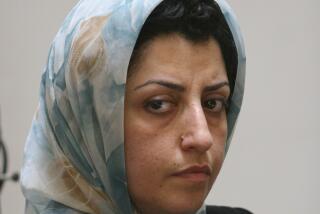Jailed reporter’s case in Iran filled with intrigue
CAIRO AND TEHRAN — International intrigue, a hunger strike and the motives of a teary-eyed boyfriend conspire in the tale of jailed American journalist Roxana Saberi. That this is unfolding in an Iran humming with political ploys and the whir of nuclear centrifuges makes it all the more tantalizing.
Saberi is in Tehran’s Evin Prison, sentenced to eight years on charges of spying for U.S. intelligence services -- an accusation she denies. Her father, Reza, says the 32-year-old freelancer, who worked for the BBC and National Public Radio, has refused food since last week. He says his daughter is “very weak” and drinking only sweetened liquids.
The judge in Saberi’s case, Hassan Haddad, says the hunger strike is a propaganda ruse to evoke worldwide sympathy and complicate the legal with the political. Judiciary spokesman Ali Reza Jamshidi was quoted by the official IRNA news agency as saying, “She is in good physical condition and not on a hunger strike.”
Somebody’s not telling the truth. The truth in Iran is often layered in mellifluous rhetoric so finely parsed that it’s difficult to discern. It is a game of contradictory images and inscrutable subtext. The Saberi case is no different. Characters have slipped into larger roles; the trial of a reporter has become the latest pirouette in the unsettling diplomatic dance between Washington and Tehran.
But for all the headlines, commentary and curious moves of Iran’s internal politics, there is an air of predictability.
The Obama administration has been making efforts at reconciliation with Tehran. This overture, though appealing to Iranian moderates, has threatened hard-liners who probably believe that rapprochement with Iran’s great enemy may undermine their power. Take away America, the boogeyman, and Iranians would be more likely to focus on their leaders’ foibles. If that happens, more attention may have to be paid to inflation, unemployment, corruption and other problems that have marred Iran for years.
Saberi, in a sense, is caught in the battle between hard-liners and reformers -- a struggle that may chart how much, if at all, the Islamic Republic opens to the West and defuses concerns about its nuclear program and strategic gambits across the Middle East, including Iraq, Lebanon and the Gaza Strip. Optimism sidles close to havoc. What’s not predictable, though, is who will win.
Will it be Iran’s populist, incendiary president, Mahmoud Ahmadinejad, who last week infuriated Jews and rallied Muslims in scathing remarks against Israel? Reform candidates who are challenging him in elections next month? Or Ayatollah Ali Khamenei -- some have suggested that Saberi ask him for a pardon -- and the ruling clerics who are the real power in a country reborn in a 30-year-old revolution? And what about America’s new president, seeking detente with Iran while insisting on Saberi’s innocence?
The wheel is in spin.
But, as one might expect, the wheel spins and clicks in many directions. There are matters of the heart. The Saberi case has become a tempest in which even the love of a weeping boyfriend, a gifted auteur and very public letter writer, is suspect. Director Bahman Ghobadi, whose films such as “Turtles Can Fly” have been widely acclaimed, has angered Saberi’s parents with his public pleas for their daughter.
In an open letter posted on the Internet, and in an interview with The Times, Ghobadi blamed himself for Saberi’s arrest. He said that she had wanted to leave Iran but that he persuaded her to stay while he worked on his latest film, “Nobody Knows the Persian Cat,” on which Saberi is credited as a co-writer. The movie will be shown at the Cannes International Film Festival this month, and Saberi’s parents sense a hint of insincerity.
“We think that he is using this opportunity to promote his films and gain global recognition,” said Reza Saberi, who has traveled to Tehran from his home in North Dakota. “Our focus is on our daughter’s freedom from prison. . . . We will not allow anyone to take advantage of our daughter’s [situation] in order to promote their own agenda.”
He added, “Roxana’s case is a legal one and any outside material is irrelevant and unwelcome.”
Roxana Saberi was writing a book on Iran when she was detained in January. It was on culture, art and politics. One might imagine new chapters will be added -- the verdict on her appeal awaits.
--
Mostaghim is a special correspondent.
More to Read
Sign up for Essential California
The most important California stories and recommendations in your inbox every morning.
You may occasionally receive promotional content from the Los Angeles Times.











